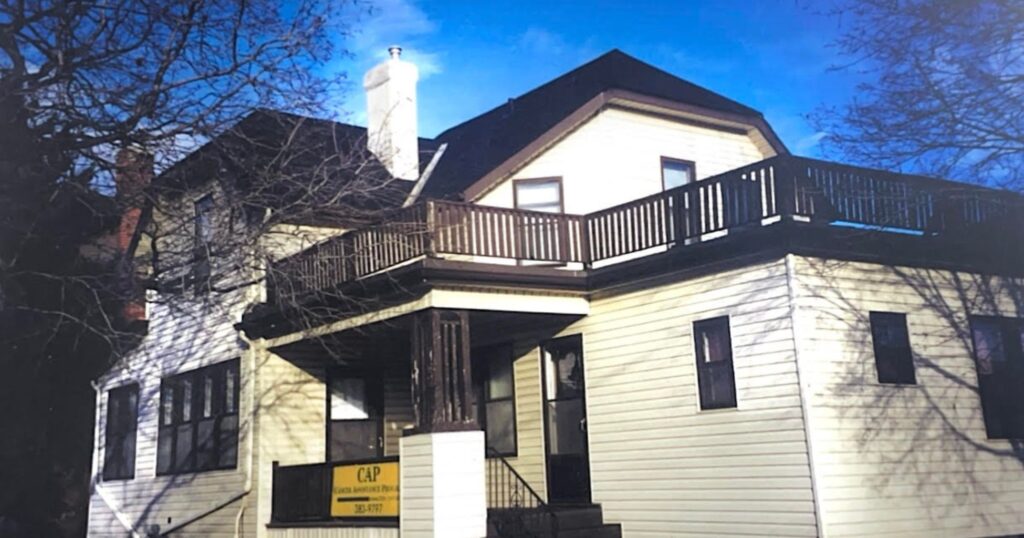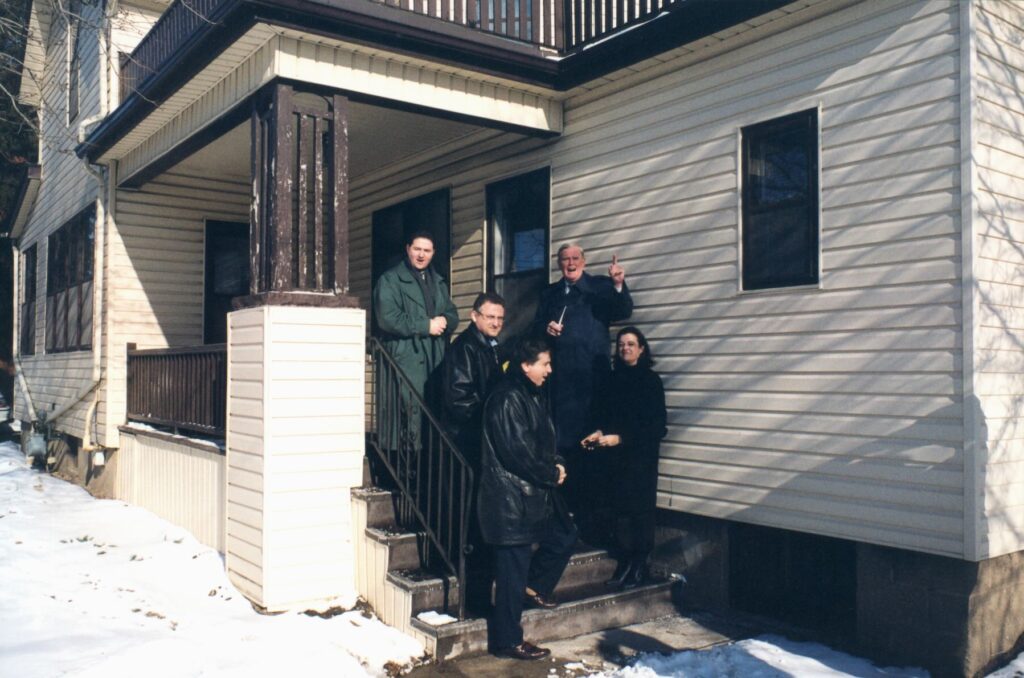The Cancer Assistance Program: There when needed

For 30 years, Hamilton's CAP has been providing rides, medical equipment, prosthetics, nutritional supplements – and now an educational podcast – to patients who get a diagnosis they never hoped to hear.
It’s a group no one ever wants to join.
But for Hamiltonians who learn they have cancer, the Cancer Assistance Program is a unique support organization that provides a range of free services when everything in life changes.
CAP is there at diagnosis, a time of chaos and fear and thousands of questions. It’s there during the exhaustion and illness that often comes with cancer treatment. It’s there during remission when clients yearn for wellness information and a way to give back.
“We are unique,” says executive director Debbie Logel Butler.
“No other community has a CAP. We're that little gem and that's why our motto is: help when you really need it.”
CAP drives cancer patients and their caregivers to and from their appointments, provides wigs, prosthetics and bras, delivers incontinence supplies and nutritional supplements, lends mobility devices, bedliners and bath chairs, provides free parking and produces an educational podcast.
It is literally life-saving help for Yashmanee Sammy, a 40-year-mother of four. She would not have been able to get treatment for cervical cancer without CAP.
She learned while pregnant that test results showed abnormalities. After the birth of her son, she was diagnosed with cancer that required daily radiation, weekly chemotherapy and procedures to insert devices for internal radiation called brachytherapy.
The news was “a hit in the heart” and she wasn’t sure how she would cope. A social worker introduced her to CAP, which arranged for volunteers to pick her up and take her home from all her appointments, even ones that began at 7 a.m.
Sammy estimates it would have cost her at least $100 for each round trip into the Juravinski Cancer Centre from her home in Caledonia. That would have amounted to at least $6,000 over the three months of treatments.
“Without CAP, I would not have had treatments. It’s just too expensive. We live paycheque to paycheque,” says Sammy, who came to Canada from Guyana about 14 years ago and is mom to 10-year-old triplets and a one-year-old baby.
“The volunteers are so caring and hardworking. They always get me to my appointments on time and they go out of their way to help me,” she says.
“I just don’t have the words to talk about CAP and how excellent they are, how amazing the drivers are.”
Just as important, talking with the people at CAP showed Sammy she isn’t alone in her cancer journey.
“I am young and thought I was the only one. I get relief in knowing I’m not.”
The volunteers
CAP has about 50 drivers among a pool of about 150 to 160 volunteers. The ranks include everyone from university students to former cancer patients and many are retirees.
The organization has an impressive 91 per cent retention rate among its volunteers, says Cindy Sharp, the manager of volunteer and client services.
“We are really lucky to have our volunteers. Volunteers tend to stay with us unless, you know, personal life changes or somebody gets sick or things like that. But it's a really strong retention rate. Our biggest recruitment is word of mouth. People find out what we're doing, and then they want to help out, too. And many, whether it's direct or indirect, many have that connection to cancer.”
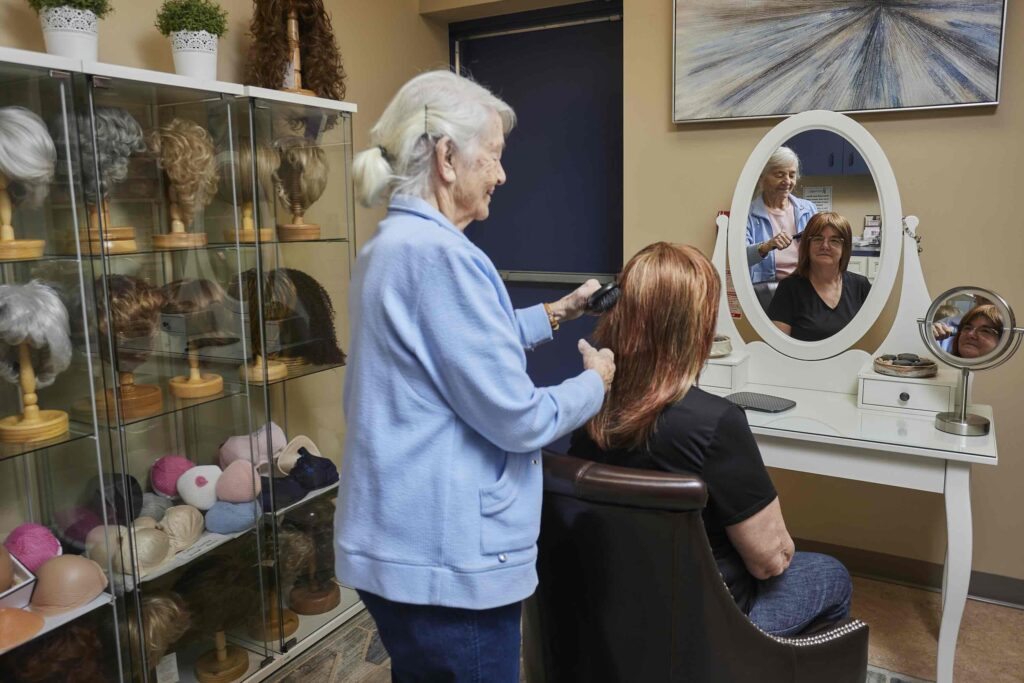
In addition to managing the daily rides and the use of three parking spaces donated by a Concession Street church, volunteers help out with office tasks, answering phones and meeting clients, take care of sanitizing and repairs in the equipment shop, book appointments for wigs or equipment, write condolence and thank you letters, and pitch in with fundraising events.
Volunteers are also charged with keeping CAP’s database up to date. Just a few years ago, that would have involved paper files in a filing cabinet. But now electronic records and barcodes track each piece of equipment, each client’s use of CAP’s services and all correspondence.
“Our volunteers do every kind of task we have here,” says Sharp. “Their primary focus is really client interaction and making sure the clients are getting the services that they need. Many of our programs are volunteer run and self-sufficient, and a staff member oversees,” says Sharp.
She joined CAP in November 2021, right in the midst of significant adoption of technology.
New functionality
“The paper system was time-consuming and incomplete. Things weren’t sometimes recorded properly and we spent a lot of time tracking things down. And in terms of statistics, we couldn't track things the way that we can now. So now this new system, everybody has access to it. So when a client calls and they register, it goes in the system, and it's immediate access for everybody. So more than one person can be working with a file at a time, which is great. It's really put an ease in the functionality of our office.”
Drive coordinator Sandy Schweyer is among five volunteers who manage each day’s pickup and drop-offs, including inputting client requests, booking drivers and overseeing routes.
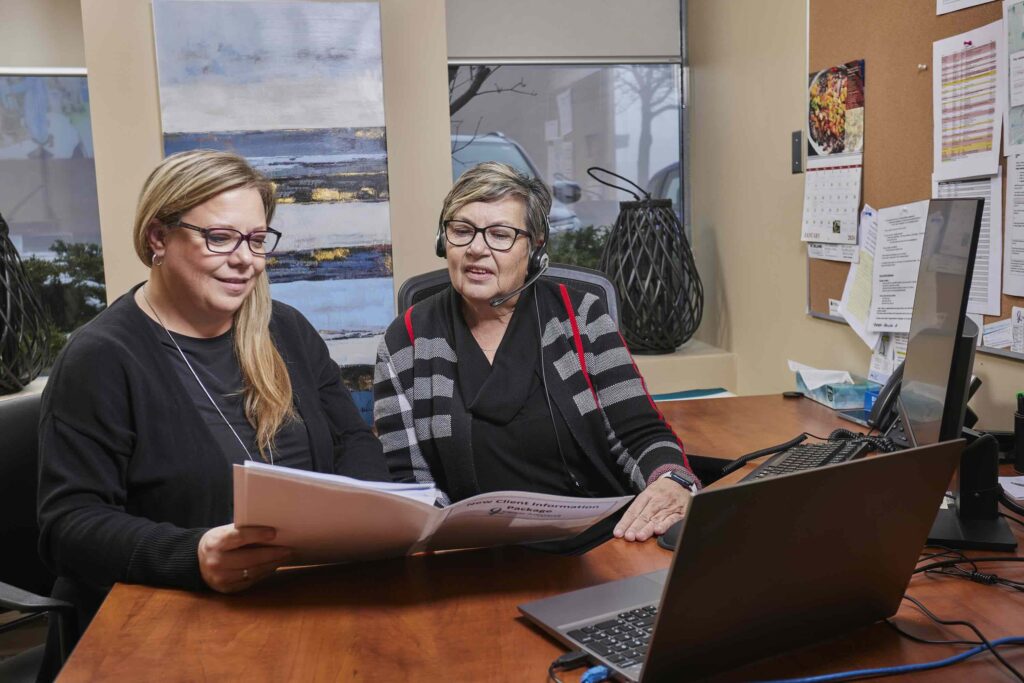
In Schweyer’s seven years at CAP, she’s seen a cumbersome and tedious handwritten paper and pencil system replaced by an electronic platform that automatically optimizes routes.
“It’s so efficient and much easier to track. I can’t believe we used to do things this way,” she says, pointing to reams of paper pulled from a banker’s box.
On the day of my visit, there are 13 drivers on the road and they will complete 41 trips. Some days the count is as high as 60.
“We are always in need of more volunteers. The demand is just growing.”
The drive coordinators also manage the Friday home deliveries of nutritional supplements and incontinence products, and the delivery and pickup of medical equipment.
Schweyer, who was “dead bored” in retirement after a 35-year career in banking, started as a volunteer driver and then started helping out as a coordinator here and there. After the pandemic, things got so busy, she traded in her driver’s seat for an office chair.
“Our drivers are wonderful and the clients are so appreciative. It’s nice to be able to help people get to their appointments. Some people have no one to get them there and parking is difficult and expensive.”
Schweyer and the other coordinators pride themselves on getting clients to their appointments on time and ensuring they get home, even if an appointment is delayed and CAP’s drivers are finished for the day. An after-hours system kicks in in which the drive coordinator arranges a taxi ride.
“We will never leave anyone stranded, no matter the weather or whatever else is happening.”

CAP’s new technology system, launched in June 2023, was built in conjunction with students and faculty at the mHealth & eHealth Development and Innovation Centre (MEDIC) at Mohawk College.
“I can't say enough about how great this team was. They're so smart,” says Sharp. “We're so we're unique in what we do. Businesses collect information but the service that we provide and the way that we use information is different. The Mohawk team came here, listened to our needs, and asked many questions. Then they were able to package it up in this nice little database that allows us to book appointments online, track information and do reports. And it’s all done in a way that is intuitive for the volunteer who is not here every day. It has to be something that they're going to be able to fall back into the next week when they’re here again.”
CAP did close to 12,000 one-way appointment trips in 2023. Sharp says it would be virtually impossible to manage that volume with the old pen and paper or manual spreadsheets. Those systems put a lot of pressure on volunteers who worried about making mistakes that would leave people missing appointments or stranded at a clinic.
The new tracking system tells Sharp that more than 1,300 new clients came to CAP in 2023. Compare that to records that show 25 people registered for CAP programs in 2009.
Recently, new client enrolments are climbing 10 per cent each year, says Sharp.
“So we need to be able to move at the speed that we can accommodate that kind of intake.”
Preparing for the future
But what does that level of growth mean for the future?
“Listen, it's been a question that's kept me up from the moment I arrived,” says Logel Butler, who joined CAP in October 2017. “It’s a case of being careful what you wish for, because the more awareness and the better you are at what you’re doing, the more dollars you’re going to have to raise to meet the need.”
Her focus has been on establishing the technology, policies and practices to prepare for a future of higher rates of cancer diagnoses.
“It may sound strange, but COVID was good to this organization. It forced us to very quickly change. We wouldn’t have been able to shift to online and technology this fast without it. That all means we can keep serving and do things better and more efficiently.”
That includes a shift to providing deliveries of nutritional supplements, incontinence products and medical equipment.
“It’s so much better than making cancer patients, when they feel their worst, come to our office. And barriers to access to transportation is a huge factor in the inequity of health care treatment. You're feeling terrible. You need a shower chair, maybe you're elderly, maybe you and your partner aren’t mobile. Imagine how hard that is to get on a bus to go get your shower chair and then go back because you live in east end Hamilton.”
CAP is a personal mission for Logel Butler whose mother-in-law had been a client.
“I knew that it was an organization with a heart and there were a lot of really great people. And I knew that it just needed someone to help them get to the next stage.”
One of the first steps was moving CAP out of a yellow house on Concession Street to an office building on Concession just east of Upper Wentworth.
“The little house wasn't working anymore. We were like Mother Hubbard, busting at the seams. We needed to look more professional and be more efficient.”
That, along with having a clear story to tell backed by statistics that show the non-profit’s impact, makes it easier to bring in bigger donors and ask for more dollars and longer commitments, says Logel Butler.
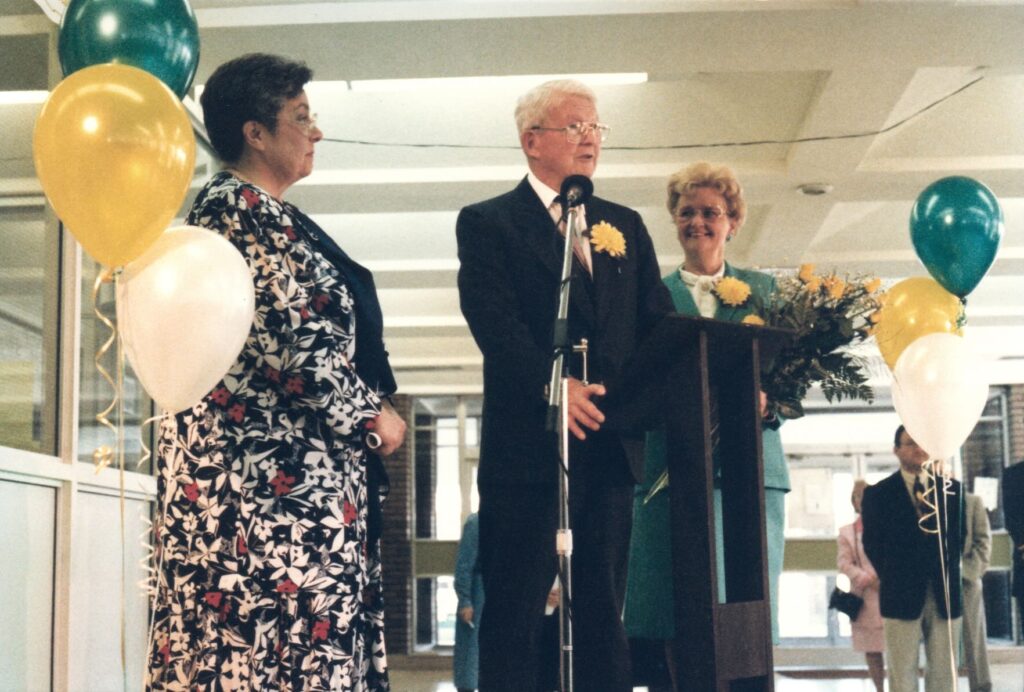
'A great story to tell'
“We are not afraid to say listen, we do great work. Here's our story: our admin fee is 13 per cent. And we're very proud of that. We have a great story to tell.”
Backed by the support of its board of directors, CAP began a major gift program, in which donors are asked to commit to contributions over five years. It also increased its events and hired a grant writer to land funding for technology and staffing.
The staff complement is now five full-time and two part-time, including a marketing and communications position funded by the Ontario Trillium Foundation.
The hope is to raise CAP’s profile such that the position will eventually pay for itself.
CAP celebrated its 30th anniversary this year with a birthday party in March. It also hosts a yearly golf tournament, a walk, auctions and a gala.
During the pandemic, CAP shifted to hybrid events and has continued to offer an online option for its gala.
“We feel it's really important that our clients can attend. Cancer clients may not want to be out in a big room with lots of people,” says Logel Butler. “So we deliver a beautiful VIP bundle to your house. You have wine, you have food, but you're in your jammies, and then you participate.”
CAP also relies on third-party fundraisers where it is the beneficiary, along with traditional direct mail campaigns and memorial donations.
“You have to be careful in an organization that you have money coming in through all different methods. And I'm a firm believer that there has to be a way for everyone to give at their comfort level.”
CAP is now in the midst of a five-year strategic planning process but it’s already built upon a solid financial footing, great staff and volunteers and a well-established range of services, says Rick Denyes, chair of the board.
He learned of CAP eight years ago when his father was going through cancer treatments at Juravinski. Denyes met with staff and was immediately impressed enough to join the board.
He served four years in various capacities before taking a break due to his job in the waste management sector. Now he’s back as president of the board.
“This organization is doing great things. My father was fortunate because he was financially able to look after the costs of going through cancer treatments. That can be as much as $2,500 to $3,000 a month. But many people aren’t prepared for that and couldn’t cope with that. CAP takes that burden off people, which is huge.”
Denyes says CAP does an “exceptional job of managing costs and squeezing budgets but one of the greatest challenges will be continuing to meet needs as cancer rates climb and there are calls to expand the geographic boundaries for our services.”
Addressing those needs will require CAP to raise its profile, he says.
“It has been under the radar for a long time. People tend to find out about us when they need us and then they are blown away.”
Another step in the reimagining of CAP, says Logel Butler, is deepening relationships with leaders and practitioners at the JCC, other allied health-care professionals and the palliative care network and increasing public awareness through presentations, a podcast and social media.
Champions in CAP's corner
CAP has some big names in its corner, including Dr. Bill Evans and Neil Johnson, vice president, oncology and site executive lead of the Juravinski Hospital and Cancer Centre at Hamilton Health Sciences.
Evans, a noted lung oncologist and retired president of the JCC, shows his support for CAP by sitting on the board and hosting its podcast The Cancer Assist Show, which has produced more than 50 episodes.
Evans’s resumé is long and impressive. He was the founder and inaugural chair of the oncology department at McMaster University and is now a professor emeritus. He was president of the JCC from 2005 to 2013, and served as regional vice-president for cancer services from the Hamilton Niagara Haldimand Brant LHIN. He joined the CAP board in 2015 and Evans still does extensive work with Cancer Care Ontario, especially in the area of smoking cessation, and sits on hospital boards in Huntsville, Bracebridge and Muskoka.
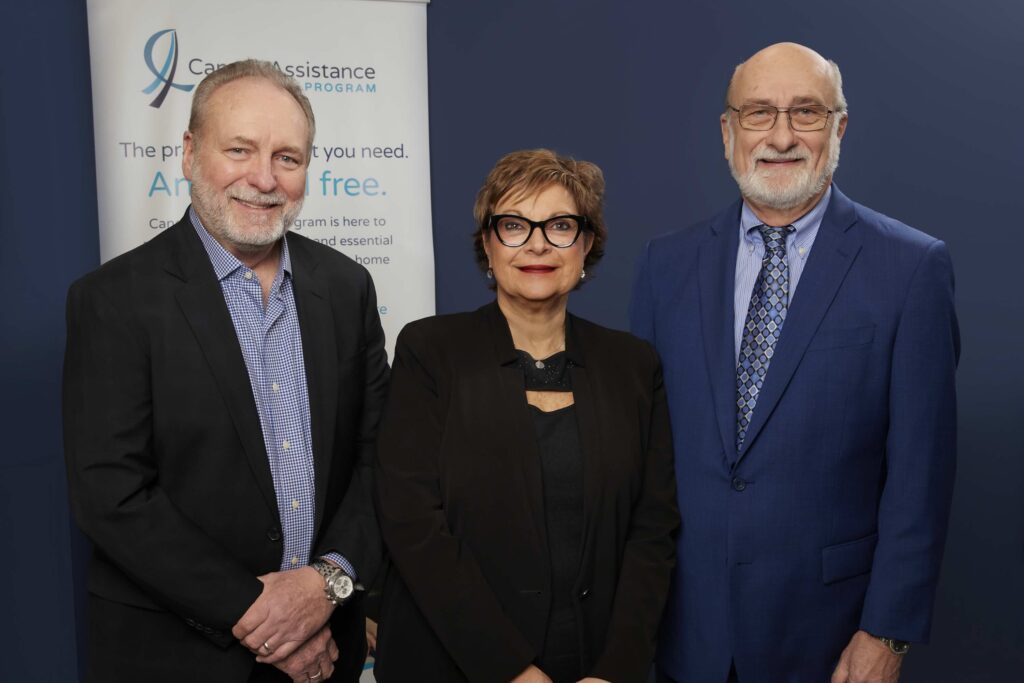
Evans says during his time leading the JCC, he probably drove past the CAP building about a thousand times but didn’t know much about the organization. It was only when he retired that he was asked to join the board by CAP’s former executive director.
“And I said, ‘Well, maybe but I don't know what you do.’ And that's kind of telling, right?”
He agreed to join but only on the condition that CAP make a deliberate effort to do outreach in high needs inner-city neighbourhoods. Evans says survival outcomes in Hamilton tend to be worse than other communities because its Code Red neighbourhoods have populations that are disadvantaged or face language barriers. They may not take part in cancer screening programs and tend to present more advanced disease.
For that reason, the JCC introduced a mobile coach to provide cancer screenings in high-needs neighbourhoods. And when cancer is found, people in these areas need CAP’s help.
“You know, just getting to and from a cancer centre is a burden. The out-of-pocket costs of cancer are quite significant.”
Those costs include transportation, parking, medications not covered by insurance, and home health-care equipment.
“For people in the inner city who are disadvantaged and below the poverty line, that's just not possible. So that's why I think CAP is an amazing organization.”
He says he’s witnessed a “professionalization of the organization” since he joined the board.
The podcast is a growing means of reaching an audience, says Evans. Downloads increased by 40 per cent in 2023 and the podcast has been heard in 15 countries on every continent except Antarctica.
“We take advantage of the expertise we have in Hamilton because we have a wealth of physicians and nurses and therapists of various types and palliative medicine doctors, etc. So I tap into that.”
With a goal of arming patients and their families with information, the podcast has delved deeply into different types of cancers, treatment and research, pain management, eating and exercise for cancer patients, how to confront a cancer diagnosis, and palliative care and resources.
“It imparts information that is up to date and hopeful. We want people to go into their care with a positive attitude, feeling hopeful that something can be done that's going to make a difference. People want to live longer and live better, and with good quality of life.”
Evans says the services provided by CAP – and the fact they are all free – are unique.
The Canadian Cancer Society provides some similar services, but there are notable differences. The national charity charges a fee for rides based on a needs assessment, doesn’t allow caregivers to travel with a patient and will only accommodate direct cancer treatments. CAP drives to a range of appointments as long as they are related to cancer treatment.
The Canadian Cancer Society also no longer provides equipment loans.
So another goal of the podcast is to encourage clones of CAP in Ontario and across Canada.
Cancer rates are increasing – with one in two Canadians expected to get a diagnosis in their lifetime – partly because we are living longer and the risk of cancer climbs substantially with age. As well, screening programs and advanced diagnostics are finding cancers that might not have been discovered before an individual died of something else.
“A tsunami of therapeutics,” immunotherapies, customized and targeted treatments based on the gene profiles of tumours, and artificial intelligence that will boost the power of cancer research are all reasons to be optimistic, says Evans.
But in the meantime, CAP wrestles with the added challenges of a backlog of cancer cases and later-stage diagnoses coming out of the pandemic, as well as the negative impacts of a difficult economy that make fundraising more difficult.
Johnson, who is also regional vice president of the Hamilton Niagara Haldimand Brant Regional Cancer Program of Ontario Health – Cancer Care Ontario, says CAP fulfills needs that are not met within the cancer treatment system.
When a patient gets a cancer diagnosis, a referral to CAP can be a lifeline, he says.
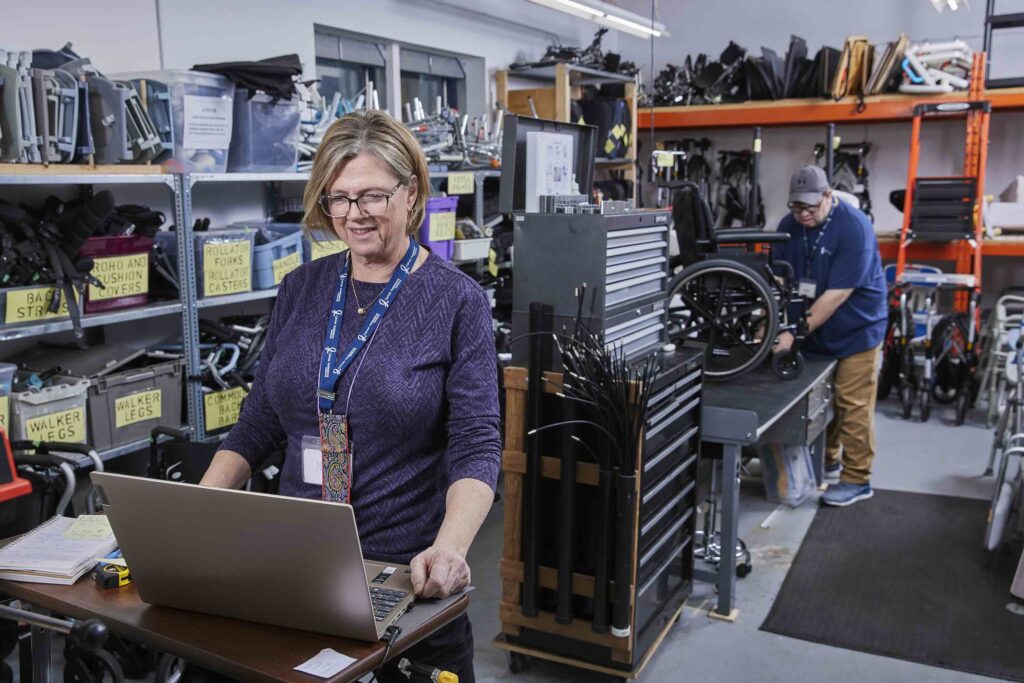
“They are shellshocked. It’s a scary time and they don’t know what’s ahead. It’s overwhelming. They need to know someone is there for them and will connect with them. It’s really important to know someone is there for you.”
“And when many people live in isolation, a real connection can be more therapeutic than anything else.”
The JCC has prioritized deepening relationships with other organizations serving the cancer community, including faith-based services, Wellwood and CAP, says Johnson.
“We have the professional, medical side of cancer care in Hamilton but also the caring community services that support that.”
CAP gets no sustainable government funding and that got the attention of Jack and Linda Benson, who manage a charitable fund called the Foundation for Human Development that supports local non-profits.
The Bensons had a friend going through cancer treatments who found the free parking through CAP to be so helpful. When they investigated and found all the services offered, they called Logel Butler in 2019.
“We were amazed by Debbie and by CAP,” says Linda. “Once we meet the team there, we couldn’t help but be part of it.”
The Human Development Foundation has existed since 1971 and was founded by engineer Keith Reekie, a mentor of Jack Benson’s who died in 2016. The foundation now supports 20 local charities that help people overcome financial barriers.
“There are so many non-profits doing terrific things for the community that don’t get steady government funding,” says Jack. “CAP is so organized and well run. If you need something, it is there.”
‘The greatest gift’: A volunteer’s story
Like many, Allard Gunnick has a very personal reason for volunteering as a driver for CAP.
His wife found out she had cancer just days after returning from a trip to Holland. Treatments began immediately. It was an overwhelming time and he felt he was in the “vortex of the storm,” Gunnick wrote in a reflection for a CAP newsletter.
“I knew deep in my heart that our time together was limited. Our children live all over the country and one overseas. They needed to get home and spend time with my wife. We needed to get her home so that could happen. While working on getting discharged we were told about the Cancer Assistance Program. We registered and that very day went home with equipment that would keep her safe and comfortable at home.”
Their family was able to make beautiful memories before his wife died four months after her diagnosis. He said in his grief he was filled with a need to return the kindness shown to his family. He started volunteering with CAP in 2020.
“I have been where the clients I drive have been,” he said in an interview. “I’ve been the caregiver, always on duty. I’ve sat through the treatments. I’ve struggled to find parking. To be able to help someone else is the greatest gift. The clients I drive are so very appreciative.”
Gunnick wrote that he’s “deeply indebted to the Cancer Assistance Program for allowing me to give to others that are navigating a path they did not choose to walk.”
Gunnick, a former teacher in a Christian school who is now remarried and lives in Aldershot, says the greatest reward of his volunteering is the connections he makes with clients. He often drives people repeatedly, so he gets to know them.
“Many like to share stories of their life. It can be hard. Sometimes the news they get from a doctor is not good but some people don’t have many people in their life.”
‘A lifesaver’: A client’s story
Gunnick’s first pickup of the day is at a small bungalow near Tim Hortons Field. He hops out of his Toyota to offer help to Lois Fielding and her husband Arnold.
Arnold faces a five-hour appointment at the JCC chemo clinic where he will get two treatments on this day.
The Fields have been getting rides through CAP for a year and a half. It would cost them $40 a day to get to the JCC by cab, something they couldn’t afford to spend.
“It’s a lifesaver for us. We’ve had such amazing experiences with the drivers,” says Lois. “If I ever won a lot of money, CAP would be the first place I’d give to.”
Arnold’s cancer, which has been treated by a stem cell transplant, can only be controlled, not cured.
The couple, originally from Nova Scotia, has lived in Hamilton for 52 years. Arnold used to work in housekeeping at the former Henderson Hospital (now Juravinski) for 20 years.
“CAP takes a lot off your shoulders,” says Arnold, who visits the chemo clinic weekly and his oncologist monthly, along with other related appointments.
“They have a really fantastic system. We are never left waiting for long.”
There at the beginning: A volunteer’s story
Helena Streun has been there since the very beginning of CAP. She was a volunteer with the Hamilton chapter of the Canadian Cancer Society and when that was closed, she was part of the volunteer group that sought out some government funding to launch CAP.
Its official founding date was May 6, 1994.
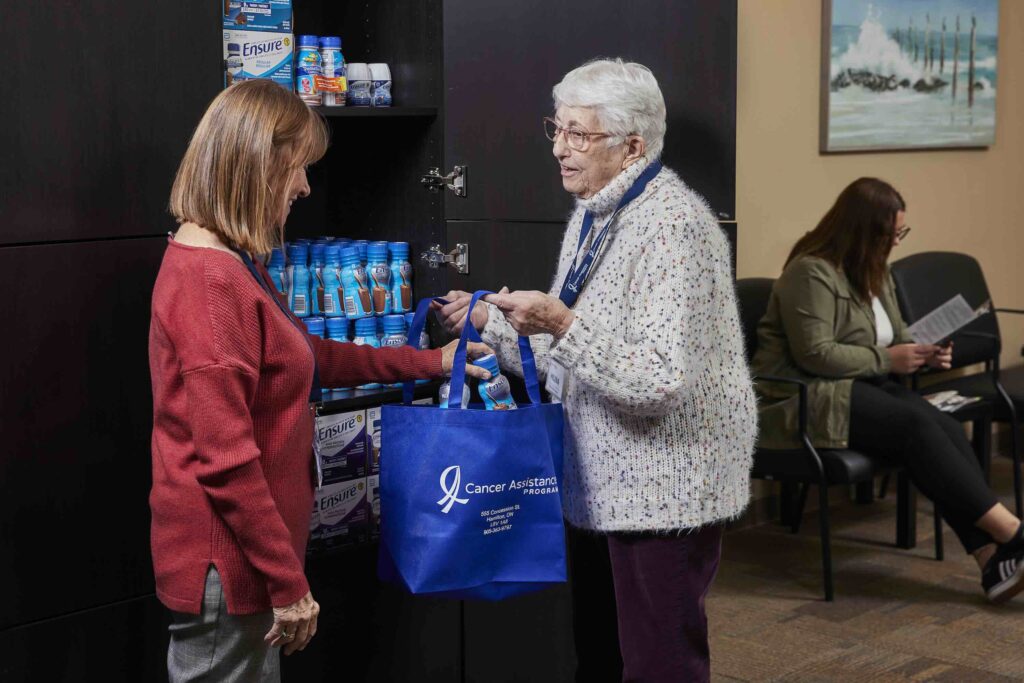
“My signature is on the charter that established CAP,” says Streun, who is now 93 and still volunteers with the organization once a week.
“It’s amazing what has happened in those years since. I am proud of what this has become,” she says, while pouring through scrapbooks that hold photos, news clippings, meeting minutes and reports from myriad fundraisers.
In its earliest days, CAP was located in a Mountain high school and then a church before it moved into a former house that was used as a doctor’s office on Concession Street.
Streun, a mother of five children, was initially drawn to volunteering in honour of an uncle who died of cancer. But then she was diagnosed with breast cancer at the age of 45.
It was treated with surgery only and Streun says she felt very lucky. But she does point out that when CAP was founded, volunteers thought perhaps in 25 years, a program to support cancer patients might not be needed anymore.
Instead, CAP has grown from supporting seven patients at its launch to more than 4,000 in 2023.
By the Numbers: CAP in 2023
No. of registered clients: 4,038
No. of new clients: 1,357 (12% higher than 2022)
No. of volunteers: 161
Volunteer hours: 23,146
No. of rides last year: 11,823 (32% higher than 2022)
No. of equipment loans: Over 2,000 pieces
Savings to cancer patients and their families: $907,000











